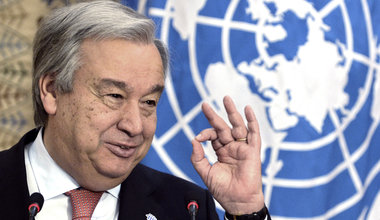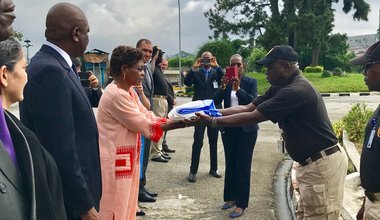Daily Brief on Côte d’Ivoire for Tuesday, 16 September 2008
Highlights
- Disgruntled volunteer teachers disrupt reopening of schools in Bouaké and Korhogo
- Volunteer health workers threaten action over claims
- UN agencies to make humanitarian assessment mission to Marahui village
Redeployment of administration
Disgruntled volunteer teachers in Bouaké and Korhogo, yesterday threatened to ransack schools, which were open on the first day of the new term. The volunteer teachers' union, the Mouvement des Enseignants Volontaires de Cote d'Ivoire (MEVCI), had called a strike starting yesterday in support of their demands to be officially absorbed into the education system and be paid backdated salaries. UNOCI has learnt that a proposal document asking that 5094 volunteer teachers be officially recruited has been sent to the Ivorian Council of Ministers by the Ministry of Education. According to the proposal document, volunteer teachers who cannot be intergrated into the education system will be considered for other work related projects by the National Programme for Reintegration and Community Development (PNRRC) and the National Civic Service Programme (PSCN).
Meanwhile, volunteer health workers in the Man area (west) are demanding that they are officially absorbed into the health care system and paid for the years they worked without salaries during the Ivorian crisis. Officials from their union, the Mouvement des Agents de Santé Volontaires de Côte d'Ivoire (MASVOCI), told UNOCI yesterday, that they would hold a meeting with their members on 21 September 2008 to decide what steps to take if their demands are not met. There are more than 1000 volunteer health workers in areas under Forces Nouvelles control who now want their contribution to the national health system to be officially recognised and compensate. Meanwhile, redeployed civil servants in the Man area, continued their ten-day strike yesterday in support of their claims for resettlement allowances and better working conditions.
Security
The gendarmerie brigade in Guiglo (west) is investigating a roadside robbery in Gbapleu, 35 km from Duékoué, on 12 September 2008, during which every single passenger on a public transport minibus, was systematically search and deprived of their valuables by armed bandits.
Arms embargo
UNOCI peacekeepers yesterday successfully conducted arms embargo inspections at the National Armed Forces of Côte d'Ivoire gendarmerie brigades in Tai (west) and Nazia in Gagnoa (south west).
Humanitarian
Following two attacks by members of the Lobi community from Korhodio village against the Koulangos in Marahui village, 75 km from Bondoukou, on 3 and 5 September 2008, UN agencies together with UNOCI will tomorrow go on a mission to assess the humanitarian situation in the villages. It should be recalled that , the Lobis from Korhodio, wrongly believing that a Lobi woman had been killed in Marahui, launched attacks on 3 and 5 September 2008 against the Koulangos in the village. As a result ten people died, 21 were injured and some 400 were internally displaced.
Human Rights
Meanwhile, also in connection with the attacks in Marahui village, the Regional Human Rights Office in Bondoukou organized a human rights awareness workshop on 12 September for 30 Lobi community leaders on human rights norms and principles. The Office appealed to the Lobis to turn to the competent authorities for the peaceful resolution of any conflicts they might have with the Koulangos. The Lobi leaders in turn said that they were willing to reconcile and live peacefully with the Koulangos.
On 12 September 2008, the Human Rights Regional Office in Duekoué, in collaboration with the Public Information Office and the Electoral Assistance Division, organized a workshop on basic human rights principles for Lokosso village communities, 15 km from Duékoué (west). The event was attended by more than 50 people from the immigrant Burkinabe, Malian and Guinean communities, as well as the native Yacouba, Baoulé and Guéré communities. On 14 September, the same Office organized another human rights workshop for members of the NGO, the Association des Femmes de Lokosso, attended by more than 200 women from the same communities. The Office emphasized, in particular, the rights of women and girls with regard to traditional practices, as Lokosso is known for its widespread practice of female genital mutilation.
 ONU
ONU Nations Unies Maintien de la paix
Nations Unies Maintien de la paix




